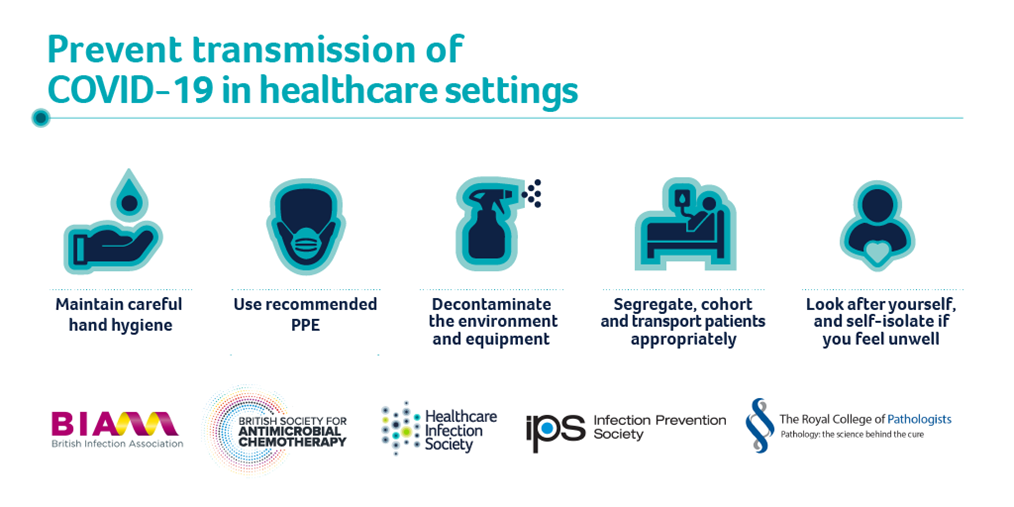
We began this year looking forward to a series of activities to celebrate the 40th anniversary of the Society and Journal of Hospital Infection (JHI), and to launching our new strategy. However, by the end of January, with news of a novel coronavirus emerging from Wuhan, China, it was clear that HIS and its members were in for a year like no other and our plans for 2020 would need to rapidly change.
February saw HIS sign the Wellcome joint statement on sharing research data and findings. We pledged to make all HIS journal papers related to SARS-CoV-2 and COVID-19 free to view, download and use upon publication, and compiled them into one resource page along with resources from other publications and public health information. The JHI published Kampf et al.’s 'Persistence of coronaviruses on inanimate surfaces and their inactivation with biocidal agents' which, to date, has over 1.8 million downloads, over 45,000 mentions on social media and almost 600 citations.
As the global number of cases of COVID-19 continued to grow, there was a surge in the need for reliable information about the management of COVID-19 in healthcare settings, and the JHI Editors made the decision to give contributors the widest range of options for rapidly reporting their early experiences by opening up the scope of the JHI Practice Points to reports related to COVID-19.
In March, in light of the progressing pandemic, HIS Council made the difficult decision to cancel or postpone all HIS events and courses for at least six months, and having sold the HIS HQ in King’s Cross Road in December, the HIS Team vacated their temporary office accommodation and began to work exclusively from home in line with national guidance.
As we moved into April, it was clear that the Society’s members were under a huge amount of pressure, and to avoid a duplication of effort, HIS began to collaborate with the BIA, BSAC, IPS and RCPath on several COVID-19 projects. For consistent practice, all five organisations agreed that it was imperative that PHE IPC guidance was followed, and we produced a simple graphic to highlight the role that healthcare workers have in preventing SARS-CoV-2 transmission in healthcare settings.
 |

The five infection societies also began researching topics for collaborative rapid guidance, the first of which on the topic of SARS-CoV-2 routes of transmission has been distributed for consultation and will be published shortly.
As a learned society, the delivery of our programme of educational events is one of the most important and accessible of our activities. The original planned educational programme for 2020 had included two Engineering Courses, two Foundation Courses, two DIPC days, two Outbreak training courses, three Trainee Days, a 40th anniversary celebration event and FIS/HIS 2020 – and only the delivery of two of these (the HIS/PHE January Foundation Course and the Trainee Day on Antimicrobial resistance and stewardship in February) was possible face-to-face.
Mindful of the importance of the Society’s role in education, on 6 May we launched our new audience-led Q&A webinar series on COVID-19 challenges and solutions. During the first webinar, focusing on infection prevention and control, our audience submitted questions to and expert panel and took part in live polls. Over 150 attendees watched the webinar live and, to date, the recording has been viewed >600 times. Since then, a further seven have taken place and the ninth and final event of the year is planned on 16 December 2020. The success of the webinar series during the year also contributed to the decision to run FIS/HIS International as an online event in November 2020, and more than 1,000 people registered to attend the event from 54 Countries.
Despite all of the disruption to most facets of normal and working life, there was one activity planned for 2020 that continued during January-September. Even during the first national lockdown construction work was permitted, and the Society’s new HQ building, Montagu House was completed and ready for occupation in September.
The purchase of the building was always intended to safeguard the Society’s long-term financial position and to provide a space for the staff team that would be flexible and future-proof. The lower ground floor has been designed to offer meeting room space that can be changed to accommodate small courses and workshops as well as meetings of HIS Council, committee and working parties. The upper two floors will be rented to tenants for the purposes of income generation.
As 2020 draws to a close, and with the first COVID-19 vaccine administered to a member of the public on 8 December, this 40th anniversary year has shown us that the Society is as relevant to members today as it was in 1980. During the year HIS has adapted its activities and survived. The foundations laid to ensure the financial resilience of the Society began with the publication of the JHI as a subscription-based journal and the organisation of the early HIS International Conferences (which attracted generous sponsorship from commercial partners). Our financial strategy continues today with plans to diversity our income, and unlike many charities, our future is secure. We have every intention of continuing to adapt and evolve to ensure we will be here to help our members navigate the next pandemic.
The Healthcare Infection Society would like to thank all of its volunteers who during 2020, despite being under intense pressure, continued to donate their time and share their expertise and experiences.
Thank you to:
HIS Council
HIS Committees
HIS Working Parties
HIS event convenors, speakers and attendees
HIS journal editors, reviewers, authors and readers
And finally - to all HIS members and the IPC community